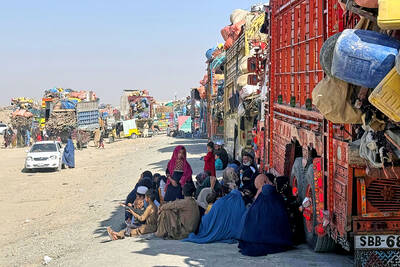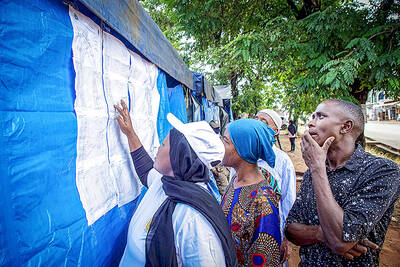Iran has handed over to the UN nuclear watchdog a document containing design information that could help make nuclear weapon parts, diplomats said on yesterday.
The International Atomic Energy Agency (IAEA) has been demanding that Iran hand over the document, which envoys said is a long way from being a blueprint for a nuclear weapon, for the past two years.
The document contains information about the machining and casting of uranium metal into spheres for nuclear warheads.
Iran is likely to portray the gesture as an important sign that it is cooperating fully with the IAEA in resolving questions about suspicious and secretive nuclear activities that date back two decades.
Iran argues that because of this cooperation on its past activities, it should not be punished with new sanctions for its ongoing programs, even though it is violating UN Security Council resolutions by continuing to produce enriched uranium.
IAEA officials had been permitted to see the document, but until now, Tehran has refused to let them have a copy.
So the fact that Iran had finally decided to hand it over was not, in itself, significant, one diplomat said, on condition of anonymity.
"It's like getting a ticket for speeding and then refusing to pay for the next two years. What's much more important is how and why they got hold of this document in the first place," the diplomat said.
Iran has always insisted that its atomic drive is purely to generate electricity for a growing population.
The Iranians did not disclose why they had possession of the document and what they intended to do with the information, said European officials, who spoke on condition of anonymity under normal diplomatic rules.
Iran was given the engineering drawings that could have helped it cast uranium into the precise shapes needed to build the core of a nuclear weapon as part of a larger black market offer in 1987, previous agency reports said.
The information, which was offered by Abdul Qadeer Khan, the father of Pakistan's nuclear weapons program and the head of what was the world's largest nuclear black market, came into Iran's hands as the country was covertly buying nuclear equipment for its program to enrich uranium.
Iran has told agency officials that it never asked for the data.
Some envoys see Iran's move, just days before the IAEA is scheduled to release its eagerly awaited report on Iran's disputed nuclear activities, as a bid to stave off more UN sanctions.
IAEA chief Mohamed ElBaradei is currently putting the finishing touches to his report, which sources said could be released either late yesterday or today.

With much pomp and circumstance, Cairo is today to inaugurate the long-awaited Grand Egyptian Museum (GEM), widely presented as the crowning jewel on authorities’ efforts to overhaul the country’s vital tourism industry. With a panoramic view of the Giza pyramids plateau, the museum houses thousands of artifacts spanning more than 5,000 years of Egyptian antiquity at a whopping cost of more than US$1 billion. More than two decades in the making, the ultra-modern museum anticipates 5 million visitors annually, with never-before-seen relics on display. In the run-up to the grand opening, Egyptian media and official statements have hailed the “historic moment,” describing the

‘CHILD PORNOGRAPHY’: The doll on Shein’s Web site measure about 80cm in height, and it was holding a teddy bear in a photo published by a daily newspaper France’s anti-fraud unit on Saturday said it had reported Asian e-commerce giant Shein (希音) for selling what it described as “sex dolls with a childlike appearance.” The French Directorate General for Competition, Consumer Affairs and Fraud Control (DGCCRF) said in a statement that the “description and categorization” of the items on Shein’s Web site “make it difficult to doubt the child pornography nature of the content.” Shortly after the statement, Shein announced that the dolls in question had been withdrawn from its platform and that it had launched an internal inquiry. On its Web site, Le Parisien daily published a

‘NO WORKABLE SOLUTION’: An official said Pakistan engaged in the spirit of peace, but Kabul continued its ‘unabated support to terrorists opposed to Pakistan’ Pakistan yesterday said that negotiations for a lasting truce with Afghanistan had “failed to bring about a workable solution,” warning that it would take steps to protect its people. Pakistan and Afghanistan have been holding negotiations in Istanbul, Turkey, aimed at securing peace after the South Asian neighbors’ deadliest border clashes in years. The violence, which killed more than 70 people and wounded hundreds, erupted following explosions in Kabul on Oct. 9 that the Taliban authorities blamed on Pakistan. “Regrettably, the Afghan side gave no assurances, kept deviating from the core issue and resorted to blame game, deflection and ruses,” Pakistani Minister of

UNCERTAIN TOLLS: Images on social media showed small protests that escalated, with reports of police shooting live rounds as polling stations were targeted Tanzania yesterday was on lockdown with a communications blackout, a day after elections turned into violent chaos with unconfirmed reports of many dead. Tanzanian President Samia Suluhu Hassan had sought to solidify her position and silence criticism within her party in the virtually uncontested polls, with the main challengers either jailed or disqualified. In the run-up, rights groups condemned a “wave of terror” in the east African nation, which has seen a string of high-profile abductions that ramped up in the final days. A heavy security presence on Wednesday failed to deter hundreds protesting in economic hub Dar es Salaam and elsewhere, some